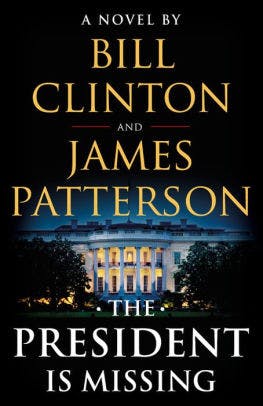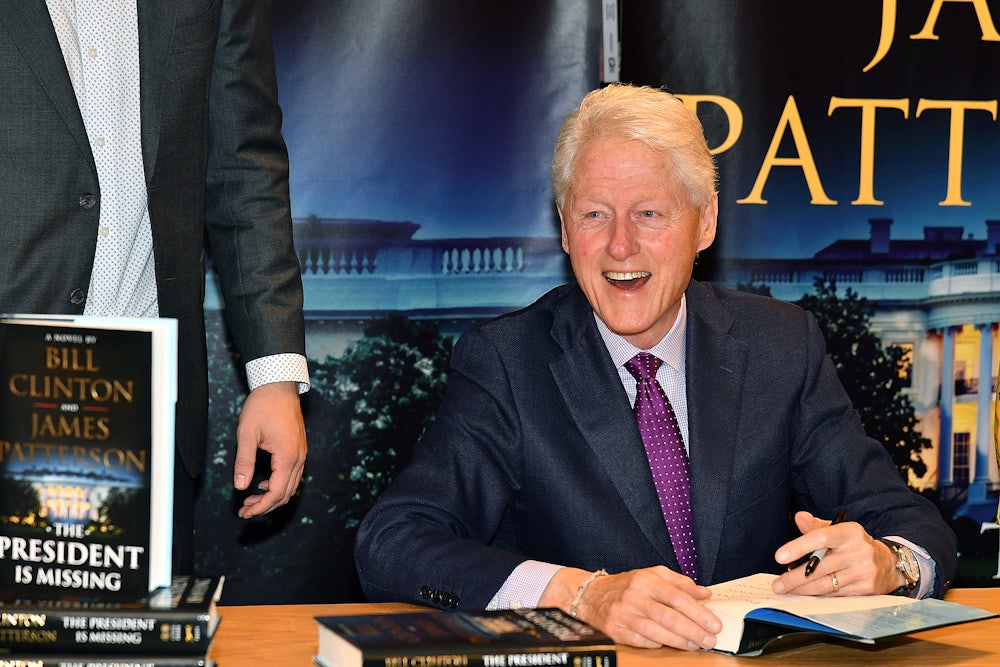“Do not ever test me again, Andrei,” the president of the United States says to the Russian premier, now that the crisis is over. “Oh, and stay out of our elections. After I speak tomorrow, you’ll have all you can handle to keep rigging your own. Now get the hell out of my country.”
So concludes The President Is Missing, a new thriller co-written by James Patterson and Bill Clinton. It is filled with “details only a President could know,” the dust jacket boasts. A fictional president named Jonathan Duncan narrates most of the book, apart from some interludes told from the perspective of assassins and cavorting cyberterrorists. Duncan, like Clinton, is from the South; he’s very concerned with election-rigging; he hates Russia; he thinks the media is too polarized; he’s a great friend to Israel. He’s a perfect hero, liberal in his sympathies but with the war-and-torture bona fides of five John McCains.
President Duncan is a fantasy fusion of Bill and Hillary, minus the scandals, shot full of popularity steroids, then mashed into an action movie complete with shootouts and helicopters and sexy Sarajevan villains. It’s impossible to know who wrote what, but the whole thing is Pattersonian in the extreme. This is not a subtle book. It clobbers the reader over the head with its prose and with its meaningful lines (“I know that most cops, most of the time, do the best they can”). The President Is Missing presents a benign fantasy of the presidency, an alternative universe where a Clintonian figure not only occupies the Oval Office but has also thwarted the Russkies—until a gendered twist torpedoes all the fun.
The basic plot is fine. President Duncan meets a mysterious couple—are they terrorists?—who somehow know a code word to which only his inner circle is privy. He realizes there is a traitor in his administration. Worse still, the couple alert him that Suliman Cindoruk, nastiest member of the nasty (but fictional) Sons of Jihad, is poised to destroy the American internet with a virus. Code-named “Dark Ages,” the plot aims at America’s Achilles’ heel—its own greatness.
As a character explicates, “One of the great ironies of the modern age ... is that the advancements of mankind can make us more powerful and yet more vulnerable at the same time.” And why? “The reason is reliance. Our society has become completely reliant on technology. The Internet of Things—you are familiar with the concept?’”

The president is familiar. An internetless America will be an America without banking, courts of law, medical care, or clean water. The water system in Los Angeles is in fact the first thing to go. “So, what—this will be Flint, Michigan, all over again?” the president asks. “It will be Flint, Michigan,” a flack replies, “multiplied by a factor of one hundred forty.”
The shoehorning of contemporary references into this novel makes for an atmosphere of corny wish fulfillment and implied Trump-bashing. When the inevitable happy ending ties The President Is Missing together in a bow, President Duncan makes a rousing speech to the American people. It’s the speech that Clinton might like to make, were he still leader of the free world. It is about election reform, lead-free drinking water, Dreamers, climate change, the opioid crisis. And when everything’s done and dusted, Duncan says, he’s even saved the newspaper business: “The mainstream media coverage, from right to left, has become more straightforward, not so much because of my speech but because, at least for now, Americans are moving away from extreme media towards outlets that offer more explanation and fewer personal attacks.” Happy day indeed.
This president is just a regular guy. In a long undercover scene, Duncan goes to a baseball game in disguise. “Ordinarily I’d be like a kid in a candy store here,” he narrates. “I’d grab a Budweiser and a hot dog.” He would do that because “there is no finer beverage than an ice-cold Bud.” Furthermore, “no food ever tasted so good as a dog with mustard at a ball game, not even my mama’s rib tips with vinegar sauce.”
This is a man of the people, a man who loves mustard, not a coddled aristocrat who owns hotels! Unlike Clinton, he also served in the armed forces. Walking through the streets of Washington, D.C., with fake eyebrows drawn on, Duncan takes pity upon a homeless Gulf War vet, purchasing him a turkey sandwich and bestowing a kind ear upon his troubles. “God bless you,” this military Tiny Tim says. Then he squeezes the president’s hand with “the still-firm grip of a warrior.” Good thing he got him that sandwich. “Even on the bad days,” Duncan muses, “there’s always something good you can do.”
The undercover president moralizes on all sorts of subjects as he walks through his nation. He sees two cops arresting a black man. “I know that there are bad cops, just as there are bad actors in every profession,” the president observes. “And I know that there are cops who think of themselves as good cops but, even if unconsciously, see a black man in a T-shirt and jeans as more threatening than a white man dressed the same way.” It’s extraordinary, the way that Duncan just happens upon such rich and potent symbols of the American experience, the kind of raw truth that he just can’t see while ensconced in the White House. He’s just a regular guy, after all, and that’s what makes him like ribs so much—I mean, that’s what makes him such a good commander in chief.
The President Is Missing is not a good book, but it is a fun one. There’s no reason for it to be 500 pages long. Finishing it, you have that feeling of opening a bag of potato chips that is only a quarter of the way full. Why put so little into something so big? The plot arc is simple, the details are fun, the solution to the mystery is really obvious, and it’s way too long. That doesn’t mean I don’t like potato chips.
But there’s an ickiness to this book, and it lies in gender politics. It’s just not possible to engage with Bill Clinton as a public figure without thinking about his relationship with the 22-year-old Monica Lewinsky. America is undergoing a revision of its original interpretation of that incident, one in which people newly recognize her youth and her vulnerability. Wrong was done by her, and that is more widely understood. Clinton can’t expect readers not to think about that. And yet during the publicity tour for the book, he has responded to questions about Lewinsky with great churlishness.
To boot, the book ends with the revelation that the villain all along was feminism. The following is a spoiler, so look away if you wish to read The President Is Missing with all bells and whistles intact. “How could you do this?” the president asks the traitor in his midst, once he’s figured it all out. The answer, when it comes, is a surprise to him. The traitor’s face is “twisted up in agony and bitterness,” full of resentment. “Says the man who gets to be president,” she replies. “Says the man who didn’t see his political career tanked” over one little mistake.
Having nurtured a grudge against the sexist media for years, one of Duncan’s closest advisers loses her entire moral compass. Alas, the things that women do to a president! It’s a weird old clang, and it’s even weirder that nobody in Clinton’s camp—for I can’t believe this book didn’t receive the eyeballs of many a sycophantic aide, prior to publication—thought it was weird. Women’s resentment does have an extraordinarily long shelf-life, as Clinton himself is finding out. But that doesn’t mean he should have written a novel about it.
